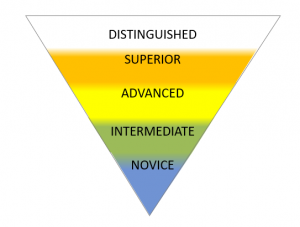Proficiency Levels
- FLAD
- Foreign Language Assessment Directory
- Understanding Assessment Tutorial
- Heritage Language Assessment Module
- Post-Secondary World Language Assessment Module
- Introduction
- Proficiency
- Placement Testing
- Assessment Plans
- Assessment Plans: The Why
- Assessment Plans: The How
- Aligning Assessment with Instruction
- Performance-based Assessment Tasks
- Designing Performance-based Assessment Tasks
- Scoring Performance-based Assessment Tasks
- Using Integrated Performance Assessments
- Designing Integrated Performance Assessments
- Intercultural Communicative Competence
- Assessing Intercultural Communication
- Assessing Cultures
- Assessment and Program Articulation
- Summary of Best Practices
- Show What You Know!
- Putting It All Together
- Resources
How is proficiency measured in world language courses and programs?
 The ACTFL 2012 Proficiency Guidelines are widely used in U.S. college and university world language courses and programs. They provide descriptions of and expectations for speaking, writing, listening, and reading at five main levels of proficiency: Distinguished, Superior, Advanced, Intermediate, and Novice. The Novice, Intermediate, and Advanced levels are further broken down into Low, Mid, and High sublevels.
The ACTFL 2012 Proficiency Guidelines are widely used in U.S. college and university world language courses and programs. They provide descriptions of and expectations for speaking, writing, listening, and reading at five main levels of proficiency: Distinguished, Superior, Advanced, Intermediate, and Novice. The Novice, Intermediate, and Advanced levels are further broken down into Low, Mid, and High sublevels.
Click on each box to learn more about the main ACTFL proficiency levels, and click here to see the full text of the ACTFL Proficiency Guidelines.
At this level, students can understand abstract and technical language on highly specialized topics, as well as different language varieties, dialects, and registers; persuade and hypothesize; and produce language with accuracy and efficiency.
At this level, students can understand precise, specialized vocabulary on a wide range of familiar or less familiar topics; produce longer narrations and more detailed and structured arguments; and accurately and fluently communicate in the language.
At this level, students can understand main ideas and most supporting details on a variety of general interest topics; narrate and describe in past, present, and future time; and produce connected paragraphs to communicate.
At this level, students can understand simple information on familiar or everyday topics; ask and answer simple questions on familiar or everyday topics; and create with language using sentences to communicate.
At this level, students can understand simple words and phrases and use words and short memorized phrases to communicate minimally.
What other frameworks are used to measure proficiency in world language courses and programs?
While the ACTFL Proficiency Guidelines are the most commonly used language proficiency levels in educational settings in the United States, there are other frameworks used to describe language proficiency that it may be helpful for you to be familiar with, including (but not limited to):
- The Common European Framework of Reference (CEFR)
This framework is widely used in Europe and other countries outside the U.S. It provide descriptions of and expectations for language use at six main proficiency levels: A1, A2, B1, B2, C1, and C2.
- The Interagency Language Roundtable Scale (ILR)
- This framework is widely used in the U.S. federal government. It provides descriptions of and expectations for language use at six main proficiency levels: 0, 1, 2, 3, 4, and 5.
Language proficiency frameworks can support you in understanding and evaluating what your students can do with the language, and they serve as the foundation of proficiency-based approaches to assessment.

